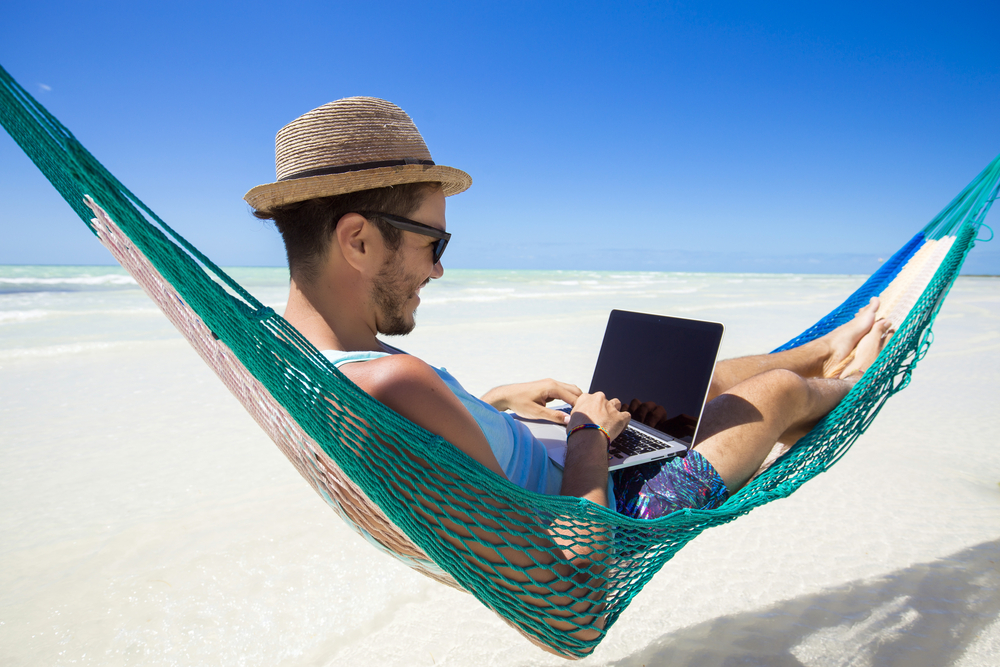
Digital Nomads: The Life of Professionals Who Are Always Traveling
Learn more about the trending profession in the online work market!

What will we see in this post
Now that technology is so universal and widespread, workers are no longer tied to a desk or an office. This freedom has empowered many people to create a work/life balance that works for their needs and schedules. However, while working from home is more common than ever, there’s another class of remote employee: the digital nomad.
Digital nomads are people who don’t like to be tied down to a single location. Instead, they go where the fun and the work are, and their life is a non-stop workcation. But while this might sound appealing, it’s not for everyone. As we’ll discuss, there are some hurdles and considerations to make before becoming a digital nomad. However, if the freedom to work and travel at the same time sounds appealing, this life might be good for you.
Here’s everything you need to know about the life of a digital nomad.
What is a digital nomad?
A digital nomad is someone who travels regularly and works remotely. Nomads are constantly moving from one place to the next, never setting down roots and often changing their scenery.
One point to note about digital nomads is that their lifestyle isn’t permanent or “just a phase.” Instead, this is how these people want to live their lives, and they make it work for the long term. In some cases, nomads may have a “home address” for business purposes, but usually, not having a fixed residence is part of the appeal of the nomad life.
Pros and cons of being a digital nomad
As we mentioned, this lifestyle isn’t for everyone. For example, some remote workers may want to spend a month or two abroad (or in another state), but they’ll always return home. So, if you’re committed to becoming a true nomad, you need to know both the good and the not-so-good elements that come with it, such as:
Pro: Full control over your work/life balance
Many people struggle to adapt their lifestyles to fit both work and personal responsibilities. All too often, our jobs define us more than we would like, and we wind up suffering because of it. As digital nomads, individuals can take charge of their schedules and live according to their terms, not their boss’s.
For example, if you work better at night, you can get projects done and check emails in the evening instead of early in the morning. This kind of flexibility is very appealing, and it’s almost impossible to go back once you’ve had a taste.
Con: No attachments can make life lonelier
If you’re a single digital nomad, it’s much easier to travel and work according to your needs. Also, your bills should be relatively low because you’re always by yourself. However, being on the road makes it harder to meet other singles and date, meaning you might start to feel lonely after a while.
You’ll also need to shed other physical attachments like extra clothing, souvenirs, and furniture. Even if your primary travel method is an RV, you can’t store too many items inside your rig. Overall, you have to become accustomed to living a minimalist lifestyle whether you’re into that or not.
Pro: Gain new experiences and meet new people
As a digital nomad, you can choose when and where to settle down for a while. Whether it’s a week, a month, or six months, you can choose the city or region that speaks to you and make the move. A big appeal of the nomad lifestyle is the ability to explore the world without needing a massive nest egg to fund the journey. Since you’re working along the way, you can pay for expenses by hunkering down and being on your computer for a few hours.
Overall, if your goal is to gather experiences and memories more than physical objects, you’ll love being a digital nomad.
Con: More logistical headaches
One advantage of putting roots down somewhere is that it’s easier to build a life. Everything from getting a driver’s license to receiving mail is harder when you’re constantly on the move. Also, you need to consider where you’re staying, how you’ll reach your destination, and how you’ll move around town once you arrive.
We already mentioned that some digital nomads may roam the countryside in an RV, but what if you want to go outside the country or overseas? Then, you have to book accommodations, such as hostels, hotels, and Airbnbs. Also, the costs of renting a car and paying for lodging by the night can add up quickly if you’re not careful.
Finally, cooking meals is another logistical challenge, so you might end up eating out a lot more than you’d like. Not only can restaurant dining increase your costs, but it’s often less healthy, too.
Pro: Explore your passions
As we’ll discuss, there are many ways for digital nomads to make money while they’re on the road. However, in most cases, nomads can focus their time and energy on industries and positions about which they’re passionate. While some nomads may need to take work to help pay the bills, many are able to fund their lifestyle by doing meaningful projects.
Outside of work, being a digital nomad means you have more freedom to explore and discover new passions. For example, if you’re artistic, you can take classes in different cities and gain new insight from different instructors. You may even decide to monetize your artwork if you’re inspired enough to create lots of it.
What kinds of jobs do digital nomads have?
Fortunately, it’s never been easier to make money online. As long as you have a computer and an internet connection, you can become a fully funded digital nomad in several ways, including:
Nine to five
Many digital nomads are full-time employees of a company – it’s just that they work remotely instead of reporting to an office. These days, you can filter job searches by those that offer remote positions, so finding one of these careers is super easy. Plus, working for a business or corporation often means a stable salary, benefits, and perks.
Freelance writing
Copywriting has become a massive industry as businesses around the world have discovered the value of content creation. Freelance writers can write about a wide array of topics for different clients, or they can focus on a niche. In many cases, nomads create their own blogs and monetize them, so they’re in total control of their writing and publishing.
Content creation
These days, content creators are far more prevalent and capable of making money through sponsorships and ad revenue. What’s great about content creation is that you can incorporate your travels into your work. For example, if you’re staying in Los Angeles for three months, you can write about what it’s like to live in the city or visit hotspots that are great for tourists.
With content creation, you can take photos, write blog posts, shoot videos, and even host a podcast. These pieces can be related to your digital nomad life or based on something else you’re passionate about, like food or sustainability practices.
Affiliate marketing
Affiliate marketing is an excellent way to generate passive income that earns money while you sleep. Although there can be a lot of work on the front end to build a sizable audience, it’s easy to automate your systems, so you don’t have to work hard to get revenue.
Broadly speaking, the way you make money as an affiliate marketer is to build an audience of subscribers to whom you can send affiliate links. These links are provided by affiliate companies who want to sell products or services. You act as the middle person to connect these businesses with their customers, and you earn a small commission for doing so.
In most cases, you won’t get rich as an affiliate marketer, but the passive income can go into an investment account or pay for some of your expenses.
E-commerce business
You may be surprised to know that you can run an e-commerce website without having or maintaining any inventory. Instead, you can work with third-party drop shippers who handle your products and ship them to your customers. All you need to do is build and manage your site, which is easy to do from anywhere.
Building a successful e-commerce brand can take time, and there are some logistical hurdles to overcome, but this option works well for passive revenue. If you put in the work upfront, you can have a fully automated business that makes money while you sleep.
IT and web services
Now that most of the world is online, there has never been a higher demand for programmers, developers, and IT specialists. Everyone needs help building their websites, keeping them up-to-date, securing those sites, and troubleshooting any programming difficulties. So, if you’re adept at this kind of work, there is no shortage of clients.
One excellent thing about IT and web services is that it’s easy to make good money from different customers. Because the work is so specialized and there’s so much demand, freelancers can charge a lot for their expertise. Overall, you can get a substantial paycheck without putting in as many hours, making it easier to live the digital nomad lifestyle.
What is the life of a digital nomad like?
Everyone puts their own spin on how they live as digital nomads. However, there are a few primary methods that nomads may use to fulfill their needs and continue living this lifestyle. Here’s a quick overview of the different types of digital nomads and how they operate:
- Semi-permanent nomads: These remote workers don’t like to move around too much because of the logistical challenges associated with constant traveling. Instead, they prefer to pick an area and settle down for months at a time. In rare cases, these nomads may be in one location for a year or more, but usually, six months is the cutoff; then, they’re off to the next location. The advantage of being this type of nomad is that it’s easier to acclimate to each region, and you can often find gig work in the area.
- The constant travelers: In this case, the nomad’s true passion is traveling and seeing as much of the world as possible. Working and making money are secondary to this first passion, so a constant traveler may always be strapped for cash. Usually, this type of nomad doesn’t stay in one place for more than a month at a time, although they might extend their stay accordingly. This lifestyle only works if you’re really passionate about traveling and are very flexible with transportation and lodging accommodations. When you’re always on the road, you might have to settle for some less-than-desirable places.
- The aimless wanderers: In most cases, digital nomads pick their next location for a specific reason. That reason may be because the spot is on their bucket list or it’s a cheap place to live temporarily. For the aimless wanderer, however, the destination always changes on a whim. For these people, the journey is the goal, not the destination. Wanderers may also make money with a mix of digital and in-person jobs. For example, they might work a summer job at a campground and then do remote work during the winter. Or, they might get a temp gig for which they have to be local, so they move to that city for the duration of the project.
Top factors to consider about the life of a digital nomad
We’ve brought up some of the downsides of this lifestyle, but now let’s break down some specific situations you should prepare for before setting off on your new journey. You may encounter issues like:
Accommodation setbacks
Ideally, you could have your pick of any lodging available wherever you find yourself. However, if you’re not independently wealthy, you’ll likely have to settle for some cheaper and potentially hazardous accommodations. Some specific problems you may face include:
- Lack of internet access: Let’s say you’re spending a week at a campground with limited internet service. You might have to scale back your workload or take a break until you return to civilization.
- Theft and security issues: Although room-sharing options like Airbnbs and hostels can be cheap, you don’t know who’s staying with you. As a digital nomad, the worst thing that could happen is getting your computer or smartphone stolen as they are your access to financial freedom.
- Dirty or uncomfortable lodging: As the saying goes, “you get what you pay for.” If you have limited funds at the moment, you might have to sleep in a hotel or hostel that might not pass a health and safety inspection.
Calculating, saving, and paying taxes
If you’re on a company payroll, your taxes should already be withheld. However, if you make additional income on the side or freelance full-time, you need to worry about paying your share to the government.
Overall, it’s up to you to calculate and save to pay your taxes throughout the year. While it’s smart to work with a remote accountant to ensure you’re always on track, you need to handle these details yourself.
Also, if you don’t have a fixed address, it’s harder to communicate with the IRS and fill out various tax forms. Finally, if you’re moving from one location to the next, you need to consider how that will affect your tax rate. For example, the tax rate in one state will be different from another’s, so you have to keep track of your earnings in each location.
Banking
Fortunately, most banking is done online anyway these days, but it’s much harder to access funds and other bank services when you’re traveling all the time. If you’re trying to run a business, the logistics of setting up a merchant account are even harder. For example, what happens when you need to withdraw cash? What about if you get paid via check instead of digital methods like PayPal or direct deposits? What if you’re traveling abroad?
Realistically, you’ll need to do some research and consult with different banks to see which one will accommodate your needs the most. If possible, meet with an agent in person, so you can discuss your challenges and address them before opening an account.
Wi-Fi and internet connectivity
One of the best ways to ensure you have reliable internet is to invest in a remote hotspot. However, these devices can also get spotty reception, meaning you’ll have inconsistent internet connectivity.
Another point to consider is if you’re sending and/or receiving sensitive information like bank account and credit card numbers. You need to be careful about potential hackers accessing your information on an unsecured network. While elements like a VPN can help alleviate cybersecurity concerns, you can’t afford to get complacent, either.
Insurance for digital nomads
There are several types of insurance you may need to consider, and they can all be harder to obtain as a digital nomad with no fixed address. These options include:
- Health insurance: Realistically, you’ll have to get an independent health insurance plan unless you work for an employer that provides benefits. As a nomad, you also have to ensure you can see a doctor or visit a clinic wherever you are. Otherwise, if you see a physician who’s out of your network, you can get a hefty medical bill.
- Life insurance: Your family and loved ones should be taken care of financially if anything happens to you. However, some life insurance providers may see your lifestyle as risky, so you could get denied coverage or have to pay higher premiums.
- Vehicle insurance: If you’re an RV nomad, you need to insure your rig, so you don’t have to pay for any damages out of pocket. However, coverage limits and minimums can vary from one state to the next. Also, if you need assistance or have to file an out-of-state insurance claim, you’ll run into different logistical hurdles. Finally, if you have a car that sits idle for months at a time, you need an insurance plan for that, too.
Emergency fund
If you’re a salaried remote worker, it might be pretty easy to save an emergency fund for a rainy day. However, one challenge of being a freelancer is the lack of a steady, reliable income. So, those who are self-employed need a sizable emergency fund to tap into when the money or work dries up. Another challenge of being a freelance digital nomad is that you might not know what your expenses will be from one location to the next. These costs are not just about transportation and lodging, either. Gas, food, and other incidentals can cost more, depending on where you are, even within the same state or country.
How to become a digital nomad
Step one: figure out how to make money
Fortunately, there are tons of opportunities for digital nomads if they know where to look. Also, because they’re working remotely, they’re not just limited to positions and openings in their home countries. For example, you could live and travel in the United States and work for a company based in Slovenia or Hungary. You could travel across Europe and work for a brand that exists solely online. Or, you can take charge and build your own business, so you’re not tied to anyone else’s schedule.
One challenge that can come from being a freelancer or entrepreneur is that it’s hard to know how much money will be coming in at any given time. For example, you might make $5,000 one month and only $2,000 the next. Realistically, it’s best to have multiple revenue streams, so you’re not putting all your nomad eggs in one basket.
Step two: determine your nomad lifestyle
Are you more of a wanderer, a traveler, or a semi-permanent nomad? Each option comes with its own pros, cons, and logistical hurdles. Also, don’t think that you have to pick one style and live with it forever. For example, you might travel a lot for a few months and then settle down in one location for six or seven months before traveling again.
Overall, knowing the type of lifestyle you want to have ahead of time will help you prepare for things like costs, transportation options, and accommodations.
Step three: start small
Becoming a digital nomad is an exciting endeavor, but you need to go into it with both eyes open. Even if you want to become a wanderer or constant traveler, you have to make sure you can support that lifestyle. At first, it may make sense to pick one area and stay there for a couple of months. Over time, as you move more often, you’ll know what to expect from each transition. This way, you can plan accordingly and avoid any potential disasters along the way.
Step four: be flexible
Above all else, being a nomad means you have to adapt to your surroundings, not vice versa. For example, what happens if a hurricane blows through and leaves you stranded somewhere? What about if a flight gets delayed or canceled? What happens if your lodging accommodations fall through and you have to find a place to stay overnight at the last minute?
Overall, success as a nomad means anticipating these setbacks and being ready for whatever comes your way. The more flexible you are, the easier it will be to adapt.
Get your digital nomad life started with Hotmart
When it comes to the money-making aspect of becoming a digital nomad, Hotmart makes it easy to monetize your creations. Whether you’re selling an e-book, a webinar, or a consultation package, Hotmart empowers you to be in the driver’s seat. You have complete control and ownership of your creations, and you can sell worldwide without any hassles or hurdles to overcome.
If you want to find out more about what it takes to work from home with Hotmart to fund your nomadic lifestyle, visit us online here.





